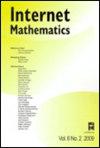Voter Model on Signed Social Networks
Q3 Mathematics
引用次数: 33
Abstract
Online social networks (OSNs) are becoming increasingly popular and are generating great interest in the study of the influence diffusion and influence maximization with applications to online viral marketing. Existing studies focus on social networks with only friendship relations, whereas the foe or enemy relations that commonly exist in many OSNs, e.g., Epinions and Slashdot, are completely ignored. In this study, we make the first attempt to investigate the influence diffusion and influence maximization in OSNs with both friend and foe relations, which are modeled using positive and negative edges on signed networks. In particular, we extend the classic voter model to signed networks and analyze the dynamics of influence diffusion of two opposite opinions. We first provide systematic characterization of both short-term and long-term dynamics of influence diffusion in this model and illustrate that the steady state behaviors of the dynamics depend on three types of graph structures, which we refer to as balanced graphs, anti balanced graphs, and strictly unbalanced graphs. We then apply our results to solve the influence maximization problem and develop efficient algorithms to select initial seeds of one opinion that maximize either its short-term influence coverage or long-term steady state influence coverage. Extensive simulation results on both synthetic and real-world networks, such as Epinions and Slashdot, confirm our theoretical analysis on influence diffusion dynamics, and demonstrate the efficacy of our influence maximization algorithm over other heuristic algorithms.签名社交网络上的选民模型
在线社交网络(OSNs)正变得越来越流行,并引起了人们对网络病毒式营销应用的影响扩散和影响最大化研究的极大兴趣。现有的研究主要集中在只有友谊关系的社交网络上,而完全忽略了许多osn(如Epinions和Slashdot)中普遍存在的敌人或敌人关系。在本研究中,我们首次尝试研究具有朋友和敌人关系的网络节点的影响扩散和影响最大化,并在有符号网络上使用正边和负边建模。特别地,我们将经典的选民模型扩展到签名网络,并分析了两种相反意见的影响扩散动力学。我们首先系统地描述了该模型中影响扩散的短期和长期动态,并说明了动态的稳态行为依赖于三种类型的图结构,我们将其称为平衡图、反平衡图和严格不平衡图。然后,我们应用我们的结果来解决影响最大化问题,并开发有效的算法来选择一个意见的初始种子,使其短期影响覆盖或长期稳定影响覆盖最大化。在合成网络和现实世界网络(如Epinions和Slashdot)上的大量模拟结果证实了我们对影响扩散动力学的理论分析,并证明了我们的影响最大化算法优于其他启发式算法。
本文章由计算机程序翻译,如有差异,请以英文原文为准。
求助全文
约1分钟内获得全文
求助全文

 求助内容:
求助内容: 应助结果提醒方式:
应助结果提醒方式:


